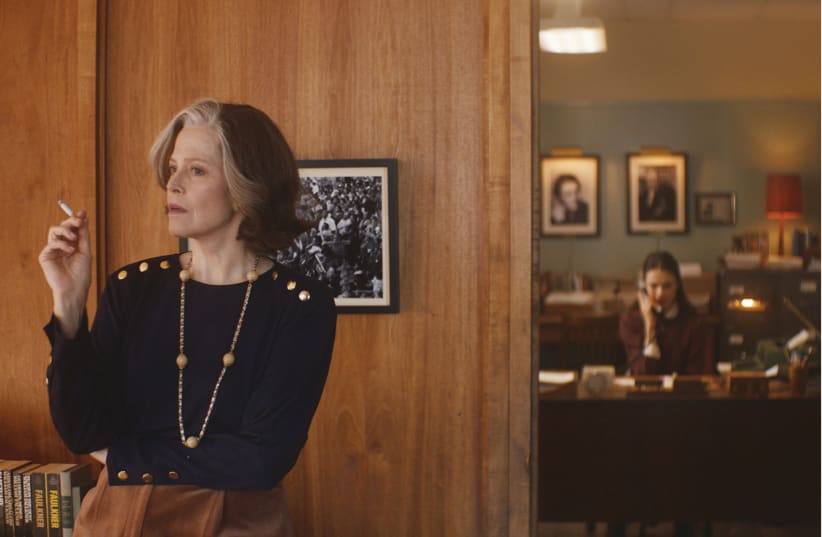BERLIN – The 70th Berlinale, the Berlin International Film Festival, opened on Thursday, and although it is under new management this year, its tradition of presenting Israeli and Jewish-themed films continues.
Last year, an Israeli film, Nadav Lapid’s Synonyms, won the festival’s top honor, the Golden Bear. This was a fitting send-off for the festival’s previous director, Dieter Kosslick, who took a great interest in Israel and Jewish issues and was a close friend of Lia van Leer, the founder of the Jerusalem Cinematheque.
This year, under the new management – artistic director Carlo Chatrian and executive director Mariette Rissenbeek – there are several films that will be of particular interest to Jewish audiences. While there are no Israeli films in the competition this year, which is the festival’s most watched program, that is simply the luck of the draw. Two Israeli directors with films coming out this year said that they preferred to bring their movies to festivals such as Tribeca and Toronto, which are perceived as being less high-brow than Berlin – one of these films is a comedy – and where they feel they are more likely to find North American distribution.
The opening-night film itself, Philippe Falardeau’s My Salinger Year, is focused on the work of the legendary Jewish American novelist, J.D. Salinger. While Salinger himself is not a character Falardeau’s film, which will have its world premiere at the festival, his work and his fans’ fervent love for it drives the plot. Set in the ‘90s, it tells the story of an aspiring poet Joanna (Margaret Qualley, who recently appeared in Quentin Tarantino’s Once Upon a Time ... in Hollywood), who works as an assistant to literary agent Margaret (Sigourney Weaver), who is the reclusive Salinger’s agent. Joanna works answering Salinger’s fan mail, and finds herself fascinated both by the author and his admirers.
Another film of Jewish interest, which will be screened in the Panorama section, is Eric Steel’s Minyan. The film, which stars Samuel H. Levine (who appeared in the film adaptation of Philip Roth’s Indignation) and Ron Rifkin, is a coming-of-age story set in New York in the 1980s about a 17-year-old boy who becomes part of the gay scene in New York’s East Village and begins to questions the Jewish religious laws with which he has grown up.
Vanessa Lapa, an Israeli-Belgian filmmaker, whose fascinating 2014 documentary about Heinrich Himmler, The Decent One, drew international acclaim, has a new film that will be in the Berlinale Special section, Speer Goes to Hollywood. It is a documentary about Albert Speer, the highest-ranking Nazi in Nuremberg to be spared the death sentence, who was of Hitler’s closest confidants and his chief architect. Speer Goes to Hollywood begins with a look at its protagonist in 1971, while Speer was working on a screenplay for Paramount Pictures, based on his bestselling wartime memoir “Inside the Third Reich.” Most of the film is based on audio cassettes Speer made to prepare for writing this screenplay, in which he attempts to whitewash the details of his Nazi past.
The Viewing Booth, by Ra’anan Alexandrowicz with Maia Levy, is a documentary in the Forum section that looks at different reactions to the same footage of Palestinians protesting. Alexandrowicz shows this footage to American students and films their reactions, focusing on one of them, Maia Levy. Six months later, Alexandrowicz invites Levy to watch more footage and shows her footage of herself watching the films he showed her the previous time and compares her reactions in a film that examines how perceptions can change over time. Alexandrowicz has made several previous documentaries, as well as the delightful feature film, James’ Journey to Jerusalem, about an African Christian who becomes a laborer in Israel.
Listening In, which will be shown in the Berlinale Shorts section, is a film by Omer Sterenberg about an Israeli soldier in military intelligence, who becomes fascinated by the phone calls he listens to between a gay Palestinian couple.
There are always a few mainstream premieres at the Berlinale, and this year, one of the most prominent will be Pixar’s new film Onward, by Dan Scanlon, which features the voices of many prominent stars, among them Julia Louis-Dreyfus.
One trend in film festivals is that the section featuring upcoming television series is getting larger and attracting more attention. This year, in the Berlinale Series section, there will be a new series, Freud, about the life of the pioneer of psychoanalysis. This Austrian series is set in Vienna in 1886, when the young Sigmund Freud was still experimenting with hypnosis, which drew ridicule and caused the medical establishment to marginalize him. This jeopardized his professional reputation, as well as his engagement, and in the series he finds solace accompanying his friend Arthur Schnitzler on cocaine-fueled nights with Vienna’s high society. No word yet on when this series will be available around the world, but it’s a story that hasn’t been told before and should be snapped up by a streaming service following its premiere at the festival.
The Berlinale will run until March 1 and will feature nearly 400 films from around the world. Its website is berlinale.de.
